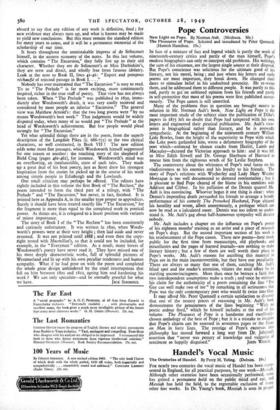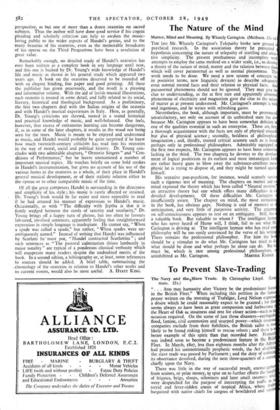Handel's Vocal Music
The Oratorios of Handel. By Percy M. Young. (Dobson. 18s.)
FOR nearly two centuries the vocal music of Handel has been repre- sented in England, for all practical purposes, by one work—Me,stah. Although other oratorios have been occasionally performed, wile has gained a permanent hold on the public mind and ear, and Messiah has held the field, to the regrettable exclusion of puny other fine works. In Dr. Young's book, Messiah is seen in PloPcr
perspective, as but one of more than a dozen oratorios on sacred subjects. Thus the author will have done good service if his cogent pleading and scholarly criticism can help to awaken the music- loving public to the wider aspects of Handel's genius, and to the many beauties of his oratorios, even as the memorable broadcasts of his operas on the Third Programme have been a revelation of great value.
Remarkably enough, no detailed study of Handel's oratorios has ever been written as a complete book in any language until now, and this one is backed by Dr. Young's wide knowledge of Handel's life and music as shown in his general study which appeared two years ago. A book on the oratorios deserved to be rounded off with an elegant binding, fine paper and good printing. All these the publisher has given generously, and the result is a pleasing and informative volume. With the aid of lavish musical illustrations, each oratorio is treated in some detail, and fully related to its social, literary, historical and theological background. As a preliminary, the first two chapters deal with the Italian origins of the oratorio and with Handel's musical experiences in Italy. Here, as generally, Di. Young's criticisms are shrewd, rooted in a sound historical and practical knowledge of music, and well-balanced. One feels, however, that excess of extraneous learning can become dangerous, if, as in some of the later chapters, it results in the wood not being seen for the trees. Music is meant to be enjoyed and understood as music, and Handel would probably be quite surprised if he knew how much twentieth-century criticism has read into his oratorios in the way of moral, social and political history. 13r. Young con- cludes with two admirable chapters, "Oratorio Singers" and "Con- ditions of Performance," but he leaves unexamined a number of important musical topics. He touches briefly on some bold strokes in Handel's instrumentation, but gives no account of his use of the various forms in the oratorios as a whole, of their place in Handel's general musical development, or of their stylistic relation either to the operas or to other comparable music of the time.
Of all the great composers Handel is outstanding in the directness and simplicity of his style ; his music is rarely affected or strained. Dr. Young's book would be far easier and more enjoyable to read if he had attuned his manner of expression to Handel's music. Occasionally, as with "The difficulty with Jeptha is that it is firmly wedged between the stools of sanctity and secularity," Dr. Young brings off a happy turn of phrase, but too often he favours laboured, involved sentences, apparently feeling that straightforward expression in simple language is inadequate. He cannot say, " When a spade was called a spade," but rather, " When spades were un- ambiguously named." Instead of writing that Handel was influenced by Scarlatti he-must put, "Handel contracted Scarlattina " ; and such sentences as "The pastoral culmination shines lambently in major tonality " are typical of a ponderous classical verbosity which will exasperate many readers despite the undoubted merits of the book. In a second edtion, a bibliography or, at least, more references to sources should be added. A brief table, summarising the . chronology of the oratorios in relation to Handel's other works and to current events, would also be most useful. A. HYATT KING.







































 Previous page
Previous page